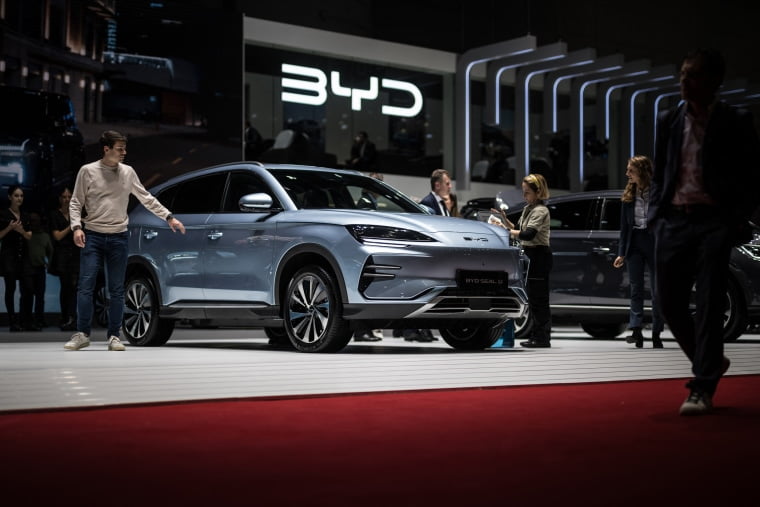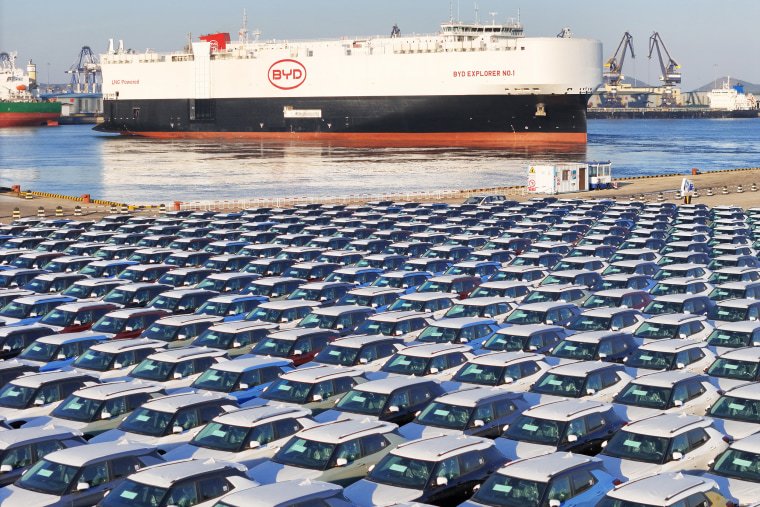As new Chinese brands like BYD increase their presence in the continent, the percentage of cars built in China in Europe is predicted to reach 25.3% in 2024.
In Short
- T&e’s research underscores the importance of localizing ev supply chains in europe.
- The goal is to maximize economic and climate benefits by reducing dependency on imports and accelerating the ev transition.
- Tariffs play a key role in shaping the localization of supply chains.
- Chinese brands like byd are increasing their presence, driving the percentage of cars built in china in europe to over 25%.
TFD – Dive into T&E’s research findings emphasizing the critical need to localize EV supply chains in Europe for unlocking full economic and climate benefits. Explore the role of tariffs and the growing momentum behind the EV push as detailed in this insightful analysis.

According to a recent policy analysis, China will account for more than 25% of all electric car sales in Europe this year, an increase of more than 5% from the previous year.
China accounted for nearly a third of battery-powered electric vehicles (EVs) sold in France and Spain last year, accounting for around 19.5% of all EVs sold in the European Union (EU), according to a research released on Wednesday by the European Federation for Transport and Environment (T&E).
Based on T&E research, the percentage of cars in the region that are built in China is predicted to increase to slightly more than 25% in 2024 as Chinese firms like BYD intensify their global development.
Even while Western companies like Tesla, which produces and distributes EVs from China, sell the majority of EVs in the EU, Chinese brands alone are expected to hold 11% of the market in 2024. T&E estimated that by 2027, that percentage might rise to 20%.
The results coincide with the European Commission’s investigation into Chinese electric vehicle manufacturers’ subsidies to ascertain whether or not they unfairly undercut domestic businesses. Brands that are not Chinese but ship from China, like Tesla and BMW, may be the subject of the current probe for subsidies.
Tu Le, the creator of Sino Auto Insights, claims that early 2010s government incentives in China caused a boom in startups and raised the nation’s battery cell capacity, opening the door for more reasonably priced EVs.
“The European Union and the United States are lagging behind because the legacy automakers have only recently concentrated on designing and engineering EVs at competitive prices,” he continued.

T&E predicted that while small SUVs and “larger cars” would continue to be marginally more affordable, it would take increasing EV tariffs to at least 25% from the present 10% in order for “medium” electric cars from China, such as sedans and SUVs, to surpass their EU counterparts in price.
The policy group added that in order to support the homegrown EV industry, Europe would also need to become more self-sufficient in the production of battery cells.
The problem they see themselves in, according to Le of Sino Auto Insights, is that they are unable to produce profitable and reasonably priced electric vehicles (EVs) without Chinese batteries since China is so far ahead of the United States and the European Union in terms of manufacturing, refining, and mineral extraction.
China-based manufacturers like BYD and Tesla have increased their production operations in Europe in response to the policy risks connected with transporting electric vehicles built in China to the continent. BYD intends to construct a plant in Hungary, while Tesla wants to increase the size of its assembly plant in Germany.
“In order to bring about the full economic and climate benefits of the transition, the goal [of tariffs] should be to localize EV supply chains in Europe while accelerating the EV push,” T&E stated in its research.
Conclusion
The shift towards localizing EV supply chains in Europe, as highlighted by T&E’s research, is crucial for unlocking the full economic and climate benefits of the transition. By focusing on tariffs and accelerating the EV push, Europe can reduce dependency and foster self-sufficiency in the electric vehicle sector, leading to a more sustainable future.
Connect with us for the Latest, Current, and Breaking News news updates and videos from thefoxdaily.com. The most recent news in the United States, around the world , in business, opinion, technology, politics, and sports, follow Thefoxdaily on X, Facebook, and Instagram .
